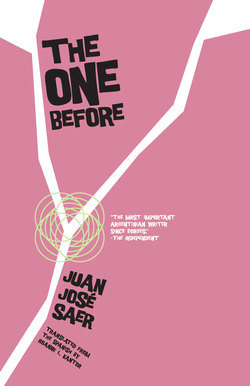Читать книгу The One Before - Juan José Saer - Страница 13
На сайте Литреса книга снята с продажи.
ОглавлениеThe Biography of Higinio Gomez
Higinio Gomez was born in a house within view of the Parana River, in 1915. It was a weekend cottage, because at that time wealthy people sought out the river. He was an only child. His mother died in childbirth and, when Higinio was ten, his father, who wanted to teach him to ride a horse, to “make a man out of him,” drunkenly mounted one and got himself killed. Higinio’s tutor sold the weekend house and packed Higinio off to an English school in Buenos Aires. Every three months he got a visit from his aunts. When he turned eighteen he left school and went to Europe. He wandered around, had a fling with an English girl, and met Andre Breton and the men he hung around with. Once in a while he attended poetry classes given by Paul Valery at the Collège de France. One night in April he participated in a literary discussion that turned into a fistfight and produced another, more serious schism in the Surrealist movement, and then, tired, he took a steamer back to Buenos Aires, just before World War II. He told some friends that being abroad made him dizzy, like wine, and by the time he found his tutor, who by then was blind, he realized he didn’t have a cent left. Botana’s wife got him a job at Critica, which was already on the decline. He argued with the other journalists over the impossibility of loving anyone after twenty-five—he thought about the English girl as he spoke, without his interlocutors ever realizing—but really he knew that, for his part, there was little or nothing left to do. “My penis,” he used to say to those closest to him, “is like a deflated balloon.” And other times, “No insurance company would give me a policy that could secure my genitals.” He wrote narrative poems, extremely long ones. Tomatis, who later compiled and wrote an introduction to a compilation of Higinio’s poems—“The Beach” and “Regions”—said there were a mountain of aphorisms among his papers, all written, funnily enough, in pencil. Tomatis had a hard time deciphering them because they were already half erased. One of them said that it would be easier to fall off of a horse and die than to find someone worth loving, even for someone who lived in a world without horses. Another aphorism, according to Tomatis, said that women die in childbirth from remorse, and a third that poetry is not a majestic and fertile river, but a rock standing firm in the current, polished by the water.
Carlos Tomatis had the privilege of getting to know his manuscripts because one afternoon in February an old actress who had been Higinio’s friend in Buenos Aires turned up at the office of the newspaper La Region and practically put a gun to his head to get him take on the project. She was accompanied by an old man dressed in a brick-colored polo shirt, jeans, and sandals. Thanks to the actress, since the old man didn’t deign to open his mouth, Tomatis devoted himself to the project and saw to the publication of the compilation. Higinio had returned to the city around 1960 and was somewhat involved in the literary scene, but two years later he rented a hotel room and poisoned himself. He left behind the aphorisms and a mountain of narrative poems in which he spoke of a yellow river and mocked the transparency of the ocean.
